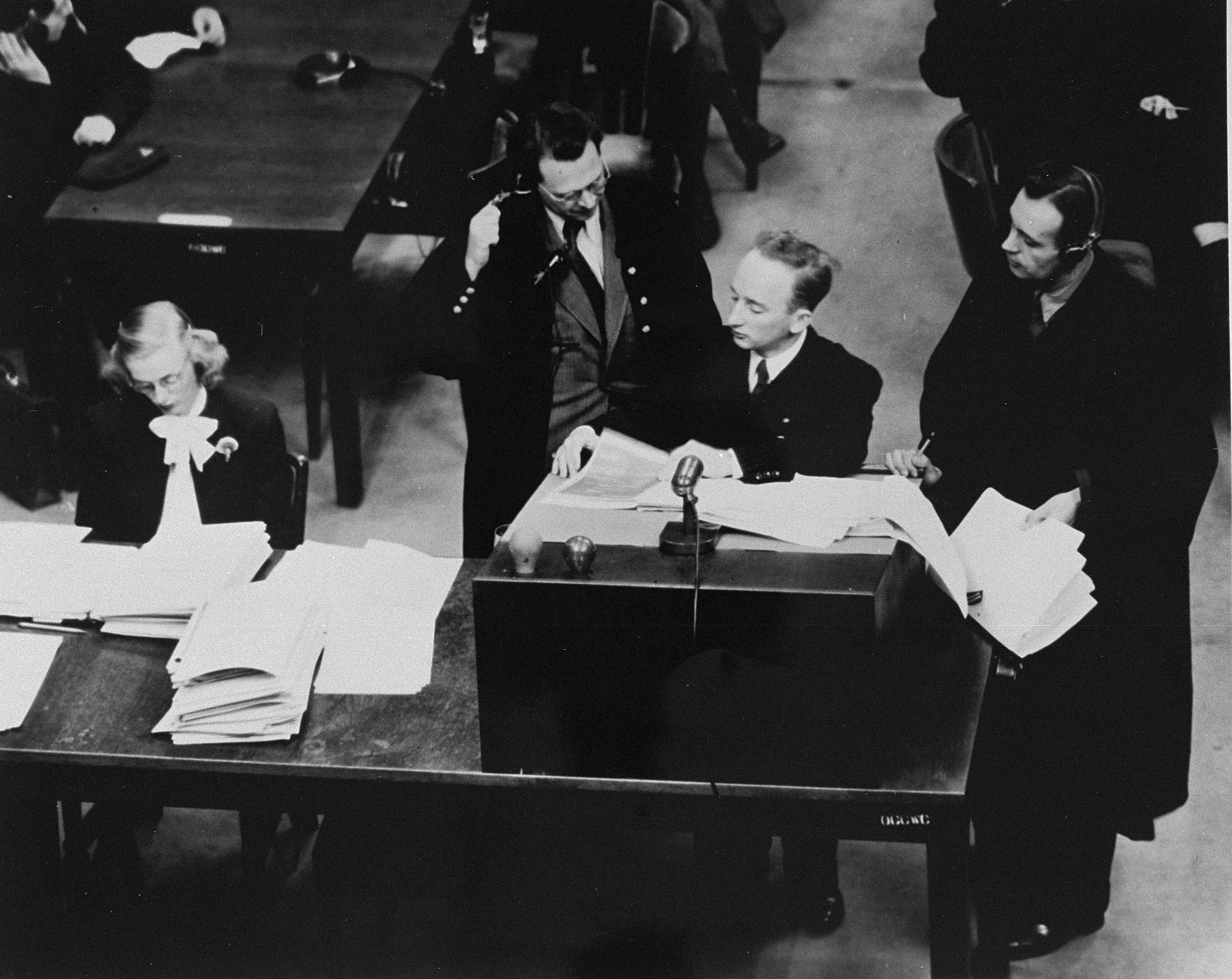“Aside from the fact that [Otto Ohlendorf] killed 90,000 Jews, I’m sure he was quite the gentleman.”
Benjamin Ferencz’s sharp words in a 2019 interview with 60 Minutes left no doubt as to the lingering sentiment from the Einsatzgruppen Trial, a proceeding in which the then-27-year-old Ferencz served as chief prosecutor and one the Associated Press called “the biggest murder trial in history.”
Born in Transylvania in 1920, Ferencz, now the last surviving prosecutor of the Nuremberg Trials, emigrated with his family to the United States just 10 months after he was born. After graduating from Harvard Law School in 1943, Ferencz enlisted in the U.S. Army and was given the job of anti-aircraft artillery gunner.
Ferencz reminisced about the Army’s odd job placement in a 2016 interview with the Washington Post, noting, “In their typical [Army] brilliance, being a Harvard Law School graduate and an expert on war crimes, they assigned me to clean the latrines in the artillery and do every other filthy thing they could give me.
“Why? Because I was a Harvard man. I was never high and mighty. They didn’t care. They were a bunch of idiots.”
The outspoken Ferencz, who barely registered over five feet tall, eventually rose to the rank of sergeant as a member of General George Patton’s Third Army. Action during the Normandy invasion followed, as did breaking through the Maginot and Siegfried lines, crossing the Rhine, and bitter fighting in the Battle of the Bulge.
It was Ferencz’s last Army assignment, however, that would forever alter the trajectory of his life.
Tasked with gathering credible evidence of Nazi war crimes for the Army’s War Crimes Branch, Ferencz encountered the depths of human depravity. The Germans maintained meticulous death registries at the camps of Buchenwald, Mauthausen, Flossenbürg, and Ebensee. These registries, which Ferencz was ordered to collect, contained the names of millions of victims.
“Camps like Buchenwald, Mauthausen, and Dachau are vividly imprinted in my mind’s eye. Even today, when I close my eyes, I witness a deadly vision I can never forget […]” Ferencz recalled in an interview with the United States Holocaust Memorial Museum.
After Ferencz’s honorable discharge in 1945 General Telford Taylor, then the chief prosecutor of the Nuremberg Trials, recruited Ferencz to return to Germany and work with a team of investigators tasked with uncovering the horrors of the Nazi regime.

It was there that Ferencz and his colleagues discovered the dossiers of the Nazi mobile death squads, the Einsatzgruppen — roving extermination squads that targeted Jews, Roma, homosexuals, political dissidents in Eastern Europe, communists, and Soviets. In the subsequent trial, the International Military Tribunal determined that nearly two million Jews were murdered by the Einsatzgruppen.
“Death was their tool and life their toy,” Ferencz told the judge during the opening statement of United States of America v. Otto Ohlendorf et. al. “If these men be immune, then law has lost its meaning, and man must live in fear.”
Ferencz continued, “Vengeance is not our goal, nor do we seek merely a just retribution…the case we present is a plea of humanity to law…
“This Nazi doctrine of a master race — an arrogance blended from tribal conceit and a boundless contempt for man himself. It is an idea whose toleration endangers all men. It is, as we have charged, a crime against humanity.”
All 22 men prosecuted by Ferencz were convicted. Most were sentenced to death. (Defendant Emil Haussmann died prior to the trial.)
After Nuremberg, Ferencz returned to New York with his wife, Gertrude, and spent several years tracking down and recovering the unclaimed heirlooms of Europe’s murdered Jews.
Motivated by what he saw during the Vietnam War, Ferencz quit his private practice and worked to establish an International Criminal Court with the power to investigate and charge individuals and nations of genocidal acts and war crimes.
The ICC was finally established in July 2002. Notably, the U.S. signed the treaty, but Congress did not ratify it.
“Crimes are committed by individuals, not movements,” Ferencz told the Washington Post. “You have to hold the people responsible in courts.”
Now in his 101st year, Ferencz remains a vocal advocate for the International Criminal Court and the International Court of Justice.
Following the American airstrike that killed Iranian general Qassem Soleimani, the New York Times published a Letter to the Editor by Ferencz in which he wrote, “I view such immoral action as a clear violation of national and international law.”
“In this cyberspace world,” he continued, “young people everywhere are in mortal danger unless we change the hearts and minds of those who seem to prefer war to law.”
historynet magazines
Our 9 best-selling history titles feature in-depth storytelling and iconic imagery to engage and inform on the people, the wars, and the events that shaped America and the world.

*Story updated on March 11, 2021.





